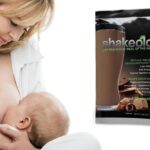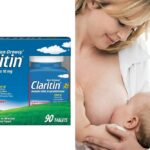Excedrin is one of the best over-the-counter pain relievers, especially for a headache. Two of the active ingredients in most forms of Excedrin are acetaminophen and caffeine, both of which are safe to consume in moderate amounts while breastfeeding.
The third active ingredient, aspirin, can harm your baby. If you choose to take Excedrin while breastfeeding, it’s important to exercise caution when doing so.
What Is Excedrin?
Excedrin is an over-the-counter pain reliever. It can be used to help you find relief from other aches and pains, but it’s usually marketed towards helping you find relief from headaches or migraines.
Active Ingredients In Excedrin
Excedrin has three active ingredients. Keep in mind that these are standard Excedrin tablets. Other varieties may include additional ingredients.
Acetaminophen
This is the same ingredient that is found in Tylenol. Some off-brand versions of Tylenol are simply sold as acetaminophen. It helps to relieve pain, including pain from headaches.
This ingredient can make Excedrin useful for treating other aches and pains as well. Acetominophen is generally considered safe for breastfeeding women as long as it is used in moderation.
Caffeine
View in gallery
Excedrin contains a very low dosage of caffeine. Each tablet only has 65 mg of caffeine in it. It’s considered safe for breastfeeding mothers to consume up to 300 mg of caffeine daily. This means that taking two Excedrin tablets is not going to put your baby at risk.
Aspirin
The third main ingredient found in Excedrin is aspirin. This ingredient is the one that is a problem for breastfeeding mothers.
Aspirin is classified as a salicylate medication. These types of medication pose a risk to infants. Although it is rare, it can cause a condition known as Reye’s syndrome.
Reye’s syndrome can result in swelling of the brain and lungs. This is particularly dangerous for infants and often results in infant death.
A small dose of aspirin might not cause this. You may be able to take Excedrin and see no adverse effects. However, every time that you take aspirin it’s like rolling a dice.
Other Remedies For Headaches
Even though you can take Excedrin while you’re breastfeeding, it’s not a good idea.
Instead, there are plenty of other options that you can use. Some otc medications are safer for breastfeeding mamas. There are also plenty of natural remedies that can help you find relief.
Safe Over The Counter Pain Medication You Can Take While Breastfeeding
- 90-count bottle of Tylenol Regular Strength Liquid Gels with acetaminophen to provide temporary relief of minor aches and pains and help reduce fever
- Each liquid-filled gel capsule contains 325 mg of acetaminophen for effective, lasting pain relief, and has an excellent safety profile when used as directed
Prices pulled from the Amazon Product Advertising API on:
Product prices and availability are accurate as of the date/time indicated and are subject to change. Any price and availability information displayed on [relevant Amazon Site(s), as applicable] at the time of purchase will apply to the purchase of this product.
Although Excedrin isn’t ideal for breastfeeding women, other medicines are. Ibuprofen is usually the preferred choice. An extensive amount of research has been conducted on Ibuprofen, and it has been deemed safe for breastfeeding mothers.
It also has a short half-life, meaning that it’s less likely to wind up in breastmilk. You can also take Naproxen on a short-term basis. Tylenol is another nice alternative.
Address The Underlying Cause Of Your Headaches
I get tension headaches. It comes from sitting in certain positions too long. Granted, I can take over-the-counter medication, but I feel that simply masks the pain.
Instead, I take frequent breaks. I’ll type for a while, and then do some housework. Alternating like that keeps the headaches at bay.
If you’re not sure what is causing your headaches to consider speaking with your doctor. Sometimes, headaches can be due to stress. Certain vitamin deficiencies can also cause headaches. This is especially important if you did not get headaches before, and now you suddenly are.
Drink More Water
Mild dehydration can cause quite a few symptoms. One of the main symptoms is a migraine or headache. Up your water intake throughout the day to see if it helps your headache. When you have a migraine due to dehydration, drinking water will help it slowly fade away.
Lavender Tea
Lavender tea is an exceptional herbal remedy for treating common aches and pains, reducing inflammation, and helping ease the pain of headaches. You can pick up a box of lavender tea at most grocery stores. Let the tea bag steep for ten minutes before drinking.
Sleep When The Baby Sleeps
Not getting enough sleep can wreak havoc on your body. One of the symptoms of being overly tired is a headache. It’s your body’s way of trying to make you both slow down and lie down.
Unfortunately, that’s a bit easier said than done when you’re a mother. If you can, ask your partner to keep the baby while you’re asleep.
Consider pumping your breastmilk so that someone else can feed the baby while you rest. You can also pick up a co-sleeper to make nighttime feedings easier. You don’t even have to get out of bed to feed the baby!
As soon as your baby falls asleep, consider taking a nap yourself. The laundry will still be there when you wake up.
Diffuse Peppermint Oil
- 100% Pure & Natural Peppermint Essential Oil - What sets Artizen Essential Oils apart are their unparalleled purity and concentration. Natural, with no adulterants or dilution, their oils provide the maximum benefit possible and are uncompromising.
Prices pulled from the Amazon Product Advertising API on:
Product prices and availability are accurate as of the date/time indicated and are subject to change. Any price and availability information displayed on [relevant Amazon Site(s), as applicable] at the time of purchase will apply to the purchase of this product.
Peppermint oil can instantly help soothe a headache. It can also help prevent them from coming back. Pick up an oil diffuser and peppermint oil to finally find relief.
It’s important to note that this can have an impact on your baby. Do not place an oil diffuser near your little one. You also do not want to put one in their room. Babies can only handle a fraction of the aromatherapy that we can, and you don’t want to overdo it.
Apply Essential Oils Topically
Topical treatment of essential oils is another option. Massage peppermint oils into your temples for relief from a headache. If you prefer to use lavender, rub a small amount above your upper lip. Inhaling lavender can help both reduce tension and the pain from your headache.
This is a wonderful option for moms that do not want to diffuse essential oils in the house with their little ones. You get all of the benefits that essential oils provide, but you know that your little one is safe.
In Conclusion
Having a migraine can disrupt your entire life. However, taking Excedrin is not safe for use while breastfeeding. Instead, opt for safe over-the-counter medications, such as Tylenol, or natural remedies to find relief.
*The statements on this blog are not intended to diagnose, treat, cure or prevent any disease. The author does not in any way guarantee or warrant the accuracy, completeness, or usefulness of any message and will not be held responsible for the content of any message. Always consult your personal physician for specific medical advice.








